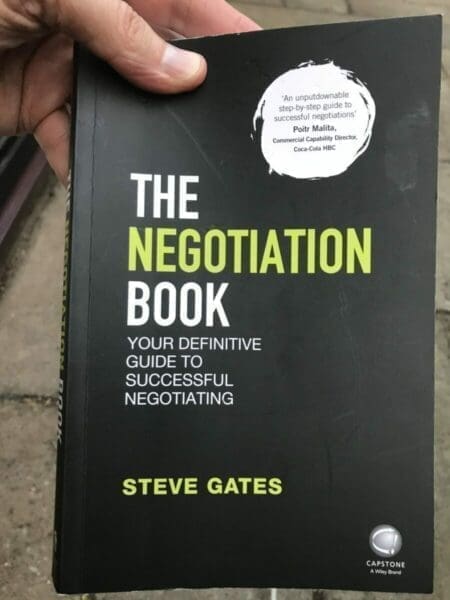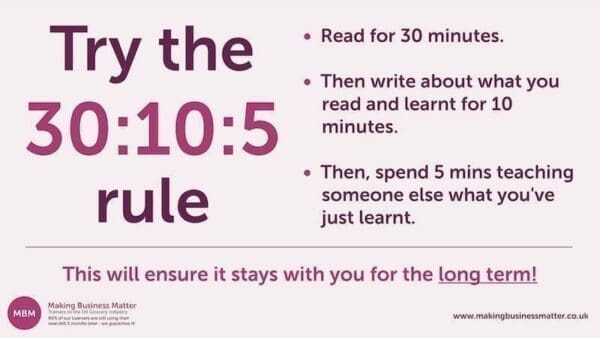The Negotiation Book: About the Book
‘An unputdownable step-by-step guide to successful negotiations’, claimed Poitr Malita, Commercial Capability Director of Coca-Cola HBC. Your definitive guide to successful negotiating. In his ‘The Negotiation Book’, Steve Gates takes us through every aspect of the skill negotiating. Full of experience, examples, and theories.
This book was £12.99 and about 205 pages. It contains around 70,000 words which would take the average reader about 5.8 hours to read, with 60% comprehension.
Overview
Steve Gates is clearly experienced. You get the impression that he has seen negotiation and got the t-shirt. After all the Gap Partnership is very successful and his baby. He takes us through the famous Gap clock face of negotiating, the 10 negotiation traits, and the 14 behaviours that make a difference.
Before any of this, however, Steve is adamant to point out that ‘The biggest challenge here is not in educating you in how to be a better negotiator, but motivating you to change the way you think about negotiations and yourself’. He is of course right. Change is hard. Breaking and forming habits is hard, and unless the prize is worth it, you won’t change.
My criticism of the book, if I may be so bold? Clearly an expert, he is. The challenge is that there is so much knowledge, so much experience, and so many tools, tips, behaviours to change, attitudes to consider, that you can’t help but think, ‘where do I start?’.
The Negotiation Book
The nuggets of advice are brilliant. Here are some examples:
- ‘Try to see the deal as they see it.’ Edward De Bono had one of his DATT (Direct Attention Thinking Tools) called ‘POV’ where he encouraged us to see someone else’s point of view. All we needed to do was write their name at the top of the piece of paper and ask, ‘What are they thinking?’.
- ‘The more you talk, the more you are likely to make a concession.’ Very true.
- ‘The two most important disciplines in any negotiation consist of asking questions and making proposals’. An excellent nugget because most people skip the stage of exploration in negotiation and go straight to proposals. Then they wonder why they are in a deadlock. Their proposal never met the other party’s desires.
- ‘Without some degree of trust, your negotiations are likely at best to feel transactional and difficult.’ The trust equation is an essential piece of learning for any negotiator.
- ‘The best way to determine the future is to create it’. I couldn’t agree more!
- ‘Make your position credible by cutting out any soft exposing statements: avoid the use of words like ‘around’, ‘in the region of’, ‘I was hoping for’, and ‘we were expecting’. The little words give us away. Most common are, ‘I need about 36%’.
- ‘Emotion has its place when used in a considered and controlled manner’. Controlled emotion is a free tool to use. Use it.
The 10 Negotiation Traits
Nerve, self-discipline, tenacity, assertiveness, instinct, caution, curiosity, numerical reasoning, creativity, and humility.

Sticky Learning ® is 7 times more effective than 1-day training courses. Plus, you will get a Chain of Evidence proving your Return on Investment. Discover soft skills training that changes behaviours long term.

The 14 Behaviours that Make a Difference
- Think clearly when faced with conflict.
- Do not allow your sense of fairness to influence behaviour.
- Maintain your self-control, use silence, and manage discomfort.
- Open extreme yet realistically to shift their expectations.
- Read their break point.
- Listen and interpret the meaning behind the words.
- Plan and prepare using all the information available.
- Question effectively.
- Always trade concessions effectively and conditionally.
- Apply analytical skills to manage the value of the deal as the negotiation unfolds.
- Create and maintain the appropriate climate for trust.
- Develop and use your agenda to help control the negotiation proceedings.
- Think creatively to develop proposals which help move the deal forward.
- Explore options to help gain agreement.
The Clock Face
The clock face is used to show the different types of negotiating. From ‘Bartering’ at 12-1pm, through to ‘Relationship Building’ from 11 pm to 12 pm.
Applying the 4 Stages of Learning to Negotiation
- Unconscious Incompetent Negotiator; When you are unaware of what and how you need to perform so you are vulnerable.
- Conscious Incompetent Negotiator; When you are aware of what you could or might be doing but have still yet to perform to your potential.
- Conscious Competent Negotiator; When you perform in your negotiations with absolute focus and without taking anything for granted.
- Unconscious Competent Negotiator; When you perform in your negotiation but can be prone to being too familiar resulting in allowing too many assumptions.

Final Thoughts
If you want to improve your ability to negotiate The Negotiation Book is a must read because Steve Gates is the modern grandfather of negotiating. The challenge for the reader is sifting through the text to identify practical takeaways that they can implement. For this reason, the writing can have a tendency to scare the reader. To think, that’s a tough skill, where do I start?
Action: For even more useful content on negotiations, check out our ultimate guide on negotiation skills.




